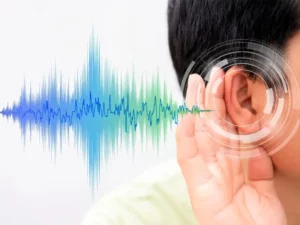
Wondering when to get your ear check-up done? If you’re in doubt, about whether or not you should go for that hearing test let this article be your guide.

Hearing is one of our most crucial senses, yet it often doesn’t receive the attention it deserves. Regular ear check-ups are essential for maintaining ear health and addressing any hearing concerns before they become significant problems. In this article, we’ll explore why ear check-ups are vital, common hearing concerns, and how to maintain good ear health.
One of the primary reasons for regular ear check-ups is the early detection of hearing issues. Many hearing problems develop gradually, and you might not notice them until they become severe. Early detection can lead to more effective treatments and prevent further deterioration.
Ear infections are common, especially in children. Regular check-ups can help identify the early signs of an ear infection and treat it promptly. Untreated ear infections can lead to more serious conditions, including hearing loss.
If you already have a hearing condition, regular check-ups are crucial for monitoring your status. This helps in adjusting treatments and ensuring that your condition does not worsen over time.
Hearing loss can affect anyone, but it becomes more common as we age. It can result from prolonged exposure to loud noises, infections, or even genetics. Signs of hearing loss include difficulty understanding conversations, needing to increase the volume on electronic devices, and frequently asking people to repeat themselves.
Tinnitus is characterized by a ringing, buzzing, or hissing sound in the ears that isn’t caused by an external source. This condition can be temporary or chronic and is often a symptom of underlying issues such as ear infections, exposure to loud noises, or age-related hearing loss.
Ear infections can be either acute or chronic. Acute ear infections are usually short-term and result from bacteria or viruses. Chronic ear infections can cause long-term damage to the ear and hearing if not treated promptly.
While earwax is essential for protecting the ear canal, excessive buildup can lead to blockages, causing discomfort and hearing loss. Regular ear check-ups can help manage earwax levels and prevent blockages.
Exposure to loud noises can damage the delicate structures in your ear. Use ear protection like earplugs or noise-cancelling headphones if you are in a noisy environment. Also, consider taking breaks from loud activities to give your ears a rest.
Moisture in the ears can lead to infections. After taking a swim or a bath, ensure you completely dry your ears. Tilt your head to each side to let water drain out naturally. Avoid using cotton swabs, as they can push earwax deeper into the ear canal and cause blockages or injuries.
A healthy lifestyle can positively impact your ear health. Regular exercise improves blood circulation, which is beneficial for the ears. A balanced diet rich in vitamins and minerals supports overall well-being, including ear health. Avoid smoking, as it can increase the risk of hearing loss.
Regular check-ups with an audiologist or an ear, nose, and throat (ENT) specialist are essential for maintaining ear health. These professionals can detect early signs of hearing issues, provide treatment options, and offer advice on how to protect your hearing.
Your doctor will start by reviewing your medical history and asking about any hearing concerns or symptoms you have experienced. This helps in understanding the context of your ear health and identifying any underlying issues.
A physical examination of your ears will be conducted using an otoscope, a device that allows the doctor to look inside your ear canal and eardrum. This helps in identifying any visible issues like infections, blockages, or abnormalities.
Hearing tests are crucial for assessing your hearing ability. These tests may include:
Based on the examination and test results, your doctor will diagnose any hearing issues and discuss treatment options with you. Treatments may include medications, earwax removal, hearing aids, or other medical interventions.
If you experience persistent ear pain, it’s essential to see a doctor. This could be a sign of an infection or another underlying issue that needs medical attention.
Sudden hearing loss is a medical emergency. If you experience a sudden drop in your hearing ability, seek immediate medical help to increase the chances of recovery.
If you have persistent ringing, buzzing, or hissing sounds in your ears, consult a doctor. Tinnitus can be a symptom of various conditions that require medical evaluation and treatment.
Your ears play a crucial role in maintaining balance. If you experience dizziness, vertigo, or balance problems, it’s important to see a doctor to rule out any ear-related issues.
Regular ear check-ups are essential for maintaining good ear health and addressing hearing concerns early on. By understanding the importance of ear check-ups, recognizing common hearing concerns, and taking steps to protect your hearing, you can ensure that your ears remain healthy throughout your life. Don’t wait for hearing problems to develop—schedule your ear check-up today and take a proactive approach to your ear health.




©️ 2023 HealthQuo. All rights reserved.
Website by DARIS